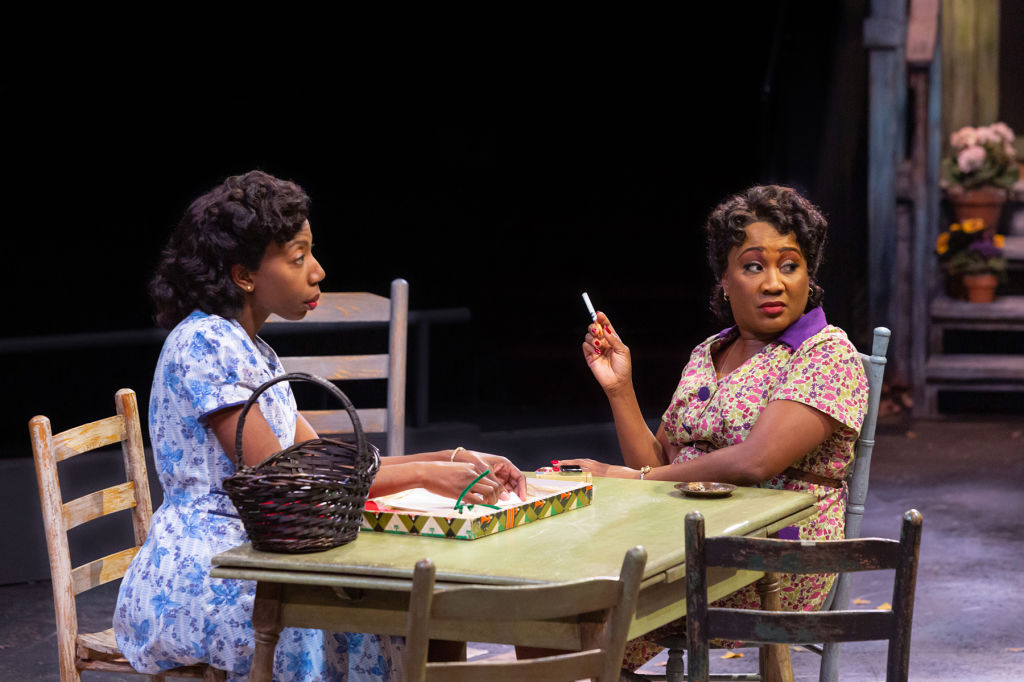Culture
 Seven Guitars. Photo courtesy of Arena Stage.
Seven Guitars. Photo courtesy of Arena Stage.
A Conversation with the Ladies of “Seven Guitars”
November 29, 2021 @ 2:00pm
Playwright August Wilson is rightfully praised for his catalog of plays chronicling the lives of African Americans in the 20th century. The ten plays of August Wilson’s Century Cycle have gifted American theatre with a bounty of complex male characters. From Troy Maxson in the Pulitzer Prize-winning “Fences,” to the tragedy of Floyd Barton in “Seven Guitars,” Wilson’s plays give voice to the nuanced and complex experiences lived by Black men in America. But… what about Black women?
During his lifetime (Wilson tragically died of liver cancer at age 60 in 2005) Wilson was criticized for what some considered a superficial or stereotypical depiction of women in his plays.
So, with “Seven Guitars” opening at Arena Stage this week, I thought it would be fun to chat with the show’s leading ladies to discuss Wilson’s play about friends who gather behind a Pittsburgh boarding house to mourn Floyd Barton, a blues guitarist who dies as he’s on the verge of making it big. The play begins just after Floyd’s funeral and continues as a flashback to the week leading up to his sudden, unnatural death.
I felt like a kid in a theatrical candy shop on an hour-long zoom call with Roz White, Dane Figueroa Edidi and Joy Jones — three of D.C.’s most prolific actors — listening to the trio laugh, analyze and dive deep into what it means to be a woman in an August Wilson play.
Talking to the trio, it’s easy to guess which character each actor plays: Joy Jones possesses the quiet dignity of Vera, Roz White the authoritative eloquence of Louise, and Dane Figueroa Edidi the sass and sparkle of Ruby. My takeaway? There is nothing superficial about August Wilson’s female characters in the hands of the fierce D.C. actresses who will be bringing them to life.
“Rather than criticize August Wilson’s writing by complaining that he didn’t flesh it out, I just say that he leaves it to each actor to do so,” says White, who plays Louise, the matronly owner of the boarding house whose backyard provides the setting for “Seven Guitars.” “You have to write within the margins what the character strives for because it’s not always written on the page.”
Edidi chimes in, her characteristic wit and sass evident through my Zoom screen.
“All of us Black people, we know these characters. There are some things that don’t need to be said about Ruby because I already know her,” she says of her character, a young woman who turns heads and rouses libidos.
Jones plays Vera, Floyd Barton’s former girlfriend. She notes that August Wilson frequently used his own mother — a strong principled woman — as inspiration for his female characters.
“August Wilson had his archetypes of women,” Jones says. “He has his good time girls, but his central maternal figure is more the quiet, stay at home type.”
“In Seven Guitars,” that character is Vera.
“Vera is a homebody, but at the same time, someone who yearns for excitement,” Jones continues. “She has a great sense of integrity and a personal code.”
Collaborating with famed director Tazewell Thompson adds to the joy of working on an August Wilson play.
“It’s like having your favorite uncle as your director,” White says. “He’s got a lot of knowledge of the period and of August Wilson.”
This is Jones’ fourth time working with Tazewell Thompson. She observes that Thompson is meticulous in honoring the language of August Wilson’s plays while also encouraging the actors to take risks.
“Tazewell is specific in the way one might be in a Shakespeare play in that you honor the language and pay attention to the musicality of the play, “Jones says.
One hallmark of August Wilson’s writing is his ability to harness the authentic language of the people he is depicting, in this case, blues musicians in 1940’s America.
“The rhythm of the speech in this play is not incidental,” White observes. “August Wilson was a huge fan of the blues. People think of the blues as always being sad but you’ve got the empty bed blues and the full bed blues in this play. It’s not blues to be sad, it’s just the rhythm of what’s going on.”
A lot has happened in the world since “Seven Guitars” was written in 1996 but the play “reads more relevant today than it did back then,” says White, noting that like many great works of art, the play transcends time by tapping into universal truths.
Edidi also points out that the reality of being Black in America has not changed.
“These are all characters who are deeply impacted by structural oppression,” Edidi adds. “All of them are fighting not simply to survive, but to thrive and have security for themselves and those who come after them.”
“When you have all cylinders firing like you do with this production… it’s going to be a good ride,” White says.
Arena Stage at the Mead Center for American Theatre: 1101 6th St. SW, DC; 202-554-9066; arenastage.org // @arenastage
Enjoy this piece? Consider becoming a member for access to our premium digital content. Support local journalism and start your membership today.







